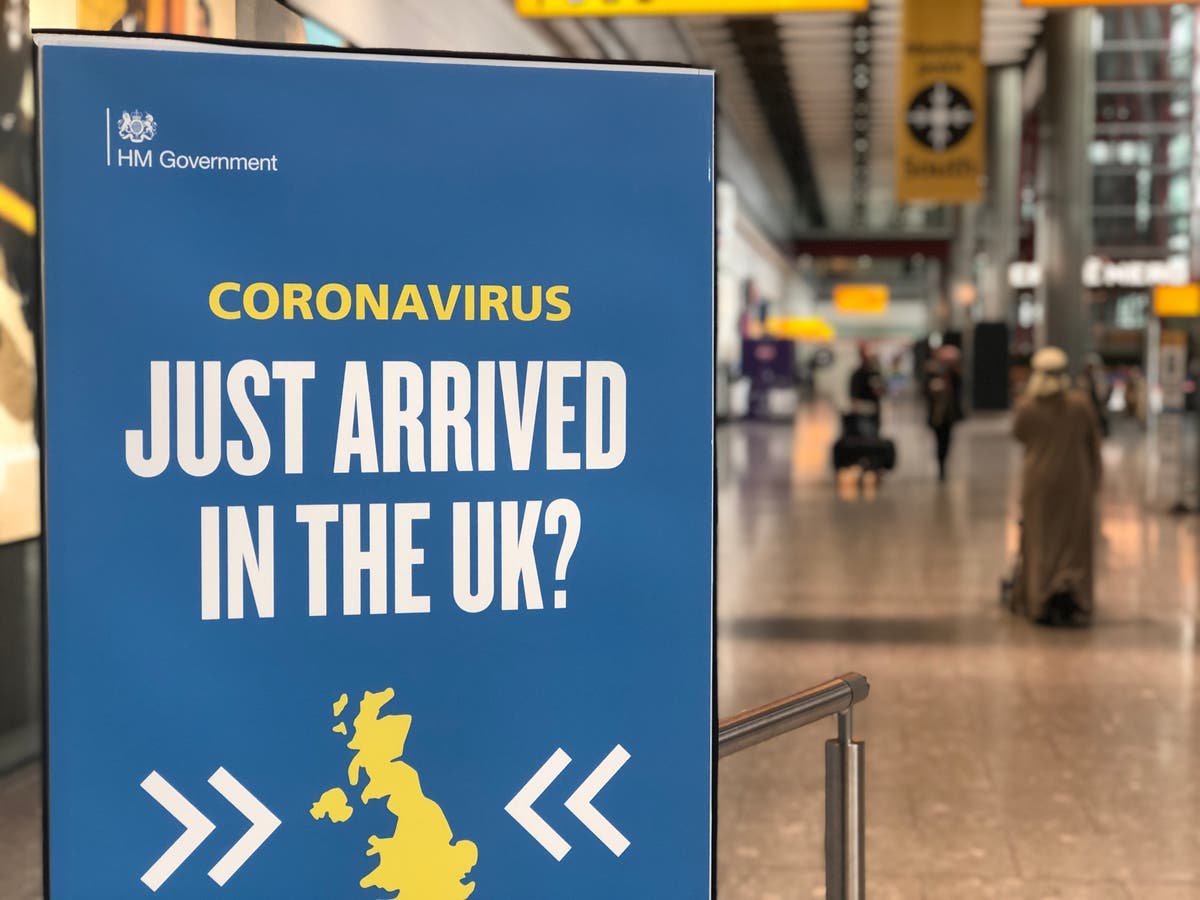Covid travel restrictions return – the new rules explained
All travellers from mainland China will need a pre-departure test, and some will be tested for Covid on arrival

Sign up to Simon Calder’s free travel email for weekly expert advice and money-saving discounts
Get Simon Calder’s Travel email
Covid travel restrictions are back. From 5 January, every traveller flying from mainland China to England will need to provide a negative test result before being allowed on the plane. It is not clear what kinds of tests will be acceptable, but the previous policy was to allow lateral flow/rapid antigen tests as well as more reliable and expensive PCR tests.
In addition travellers arriving direct from China may be selected for a second test on arrival.
The government announced the measures on Friday night – a day after saying there were no plans to reintroduce Covid testing.
What exactly is the government proposing – and why?
Passengers arriving from mainland China, not including Hong Kong, to England from 5 January will need to take a Covid-19 test no more than two days before departure and show the negative result to airline staff at check-in.
The only flights from mainland China currently arrive at London Heathrow, but the intention is to apply the restrictions UK-wide.
After they land, passengers may be randomly selected for a second test, “to enhance existing measures to monitor for new variants”.
Since China abandoned its “zero Covid” policy, the virus has spread extremely fast through the People’s Republic. Beijing plans to ease border restrictions next week, allowing more citizens to leave.
The UK government fears the sudden changes increase the risk of a dangerous variant arriving. That concern is shared by Italy, the US, Japan and an increasing number of other countries that have introduced testing requirements.
Weren’t we told that Covid restrictions were over?
Yes. Last March, the-then transport secretary, Grant Shapps, said the UK was “leading the world in removing all remaining Covid travel restrictions” and thereby “keeping international travel moving”.
The government said it would “maintain a range of contingency measures in reserve” but deploy them only “in extreme circumstances” to delay any future harmful variants of Covid entering the UK should the need arise.
On Thursday, the government told me emphatically: “There are no plans to re-introduce Covid testing or additional requirements for arrivals into the UK.”
But now Mark Harper, the transport secretary, insists: “China’s lack of reliable Covid data means these sensible, proportionate and temporary measures are needed ahead of their borders reopening.”
Why only China, when many other countries have high levels of Covid?
Covid is ripping through China, and the government in Beijing plans to ease its border restrictions next week, allowing more citizens to leave.
Ministers here say the travel restrictions are necessary to detect “any new variants which may be circulating in China that could evade the immune response of those already vaccinated or which have the potential to successfully outcompete other variants and spread internationally”.
They are concerned about what they say is Beijing’s unwillingness to share data on the spread of the virus. But the UK government says it is “working with China on next steps” and that the measures will be reviewed “if there are improvements in information sharing and greater transparency”.
Covid cases have surged in China since the country lifted restrictions
(Copyright 2022 The Associated Press. All rights reserved)
Are many people arriving in the UK from China?
No. According to aviation analytics firm Cirium, six non-stop flights with 1,795 seats are due into the UK from China over the next week. The planes will come in from Beijing, Shanghai, Guangzhou and Qingdao. To put that in perspective, more than 10 times as many people come in from New York alone each day.
There are, though, three daily flights to London Heathrow from Hong Kong on Cathay Pacific and British Airways – and it is not clear whether people who travel from other parts of China to Hong Kong will be challenged.
Many passengers between China and the UK travel via the Gulf, in particular Dubai and Doha, and it is unclear whether they will be checked.
If an arrival from China tests positive for Covid, what happens next?
The UK Health Security Agency is launching surveillance from Sunday 8 January which will see randomly selected arrivals from mainland China tested for Covid at the airport.
The government says: “All positive samples will be sent for sequencing.”
But at this stage, there is no indication that arrivals with Covid will need to self-isolate or go into hotel quarantine – which is what positive cases who arrive in Japan from China have to do.
What do the scientists say?
Professor Susan Hopkins, chief medical advisor at the UK Health Security Agency, said: “In order to improve our intelligence, we are enhancing our surveillance, in addition to our current routine testing protocol.”
But she said there is no evidence of potentially harmful variants circulating.
“The evidence suggests the recent rise in cases in China is due to low natural immunity and lower vaccine uptake including boosters rather than the emergence of new Covid-19 variants,” she said.
Ahead of the ban being announced, Christina Pagel, professor of operational research at University College London, said China’s situation “gives a lot of potential for mutations and new variants to emerge”.
But Professor Pagel – a member of the Independent Sage group of scientists – said: “Simply adding requirements for China isn’t effective and to me seems like performative restrictions. Variants spread beyond borders and they can emerge anywhere.”
She said that to be effective, travel restrictions would require negative PCR testing of everyone flying to the UK from anywhere in the world.
After the move was announced Adam Kucharski, co-director of the Centre for Epidemic Preparedness & Response, said: “If an epidemic is growing, most infected people will have been infected very recently. Which also means they’re less likely to test positive.”
A woman wearing a mask walks on the street of Beijing, Friday, Dec. 30, 2022
(Copyright 2022 The Associated Press. All rights reserved)
How has the travel industry reacted to the move?
With anger in some quarters. China is extremely important for global tourism and business travel. Before the pandemic, it accounted for one-fifth of all international spending. The travel industry was looking forward to a swift increase in Chinese people venturing abroad to help their financial recovery.
Clive Wratten, chief executive of the Business Travel Association, called the move “a sucker punch to the entire travel industry” and “a huge step backwards for customer and corporate confidence”. He said Britain could be “inching back towards being an isolated island”.
But Paul Charles, chief executive of The PC Agency, said: “This is a sensible and targeted light touch measure which ensures those departing China are Covid-negative. It also buys time for the UK government to gather and assess more information themselves about the extent of Covid within the country.
“This measure will help to prevent any future wider measures which would be damaging to travel overall.”
Could Covid testing spread?
That is clearly a possibility. China is a special case of a vast population in which Covid infections are running extremely high and with a lack of openness from the health authorities.
But following the government’s speedy U-turn on China, if other nations are perceived to present a threat because of high infection levels or fears of dangerous variants then pressure could grow for expanding controls once again.
The World Health Organisation insists: “Travel bans will not prevent the international spread, and they place a heavy burden on lives and livelihoods.”

 Konoly
Konoly 































